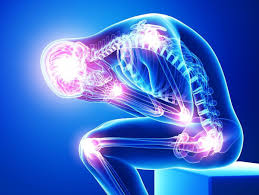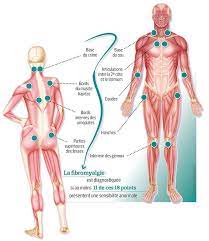Fibromyalgia: Causes, Symtoms, Complications and Treatment
Fibromyalgia (also known as diffuse idiopathic polyglottis syndrome or DIPS, fibritis, or fibromysitis) is a disorder that combines physical and psychological symptoms of pain. Recognized by the World Health Organization in 1992, its nature and existence are still the subject of debate in the medical community. For more information or to get the natural treatment just contact the center Afrique Santé Bio.
What is fibromyalgia?
pain everywhere
Fibromyalgia is a disorder that combines persistent muscle or joint pain, chronic fatigue, difficulty sleeping, depressive symptoms, and anxiety. For months, the patient kept complaining of pain everywhere. Normally painless stimuli cause pain, while normally tolerable pain can be experienced as severe pain. In more than 80% of cases, fibromyalgia affects women between the ages of 30 and 55. It occurs more frequently during menopause.
WHAT ARE THE SYMPTOMS OF FIBROMYALGIA?
Fibromyalgia is characterized by permanent muscle or joint pain, aggravated by stress, cold, humidity and emotions. In addition, chronic fatigue sets in, sometimes in connection with sleep disorders. Depression and anxiety are 4 times more frequent than in the general population.
In some cases, people also complain of:
- widespread pain
- joint and muscle stiffness after sleeping
- headaches
- irregular sleep patterns
- tingling and numbness in the hands and feet
- restless legs syndrome
- sensitivity to cold or heat
- difficulties with memory and concentration, known as “fibro fog”
- fatigue
- irritable bowel syndrome (IBS)
The following may also occur:
- problems with vision
- nausea
- pelvic and urinary issues
- rapid weight gain
- dizziness
- cold– or flu-like symptoms
- skin problems
- chest symptoms
- depression and anxiety
- post-traumatic stress disorder
- breathing problems
Symptoms can appear at any time during a person’s life, but they are most common between the ages of 30 and 50.
An inability to perform a task or exercise due to muscle pain may also be experienced.
When fatigue is the main symptom of the disease, it is called chronic fatigue syndrome.
Causes:
The exact cause of fibromyalgia is unclear. However, current thinking in the field of rheumatology suggests that fibromyalgia results from an issue with pain processing in the central nervous system (CNS).
Several factors may increase a person’s risk of developing fibromyalgia, includingTrusted Source:
- a stressful, traumatic physical or emotional event, such as a car accident
- repetitive injuries
- RA or other autoimmune conditions, such as lupus
- CNS problems
- the way the genes regulate how a person processes painful stimuli
Fibromyalgia may also be hereditary. Females who have a close relative with fibromyalgia have a higher risk of the condition.
People with RA, lupus, or spinal arthritis, known as ankylosing spondylitis, have a higher likelihoodTrusted Source of developing fibromyalgia, as do individuals with some other rheumatic conditions.
WHAT ARE THE COMPLICATIONS OF FIBROMYALGIA?
Although it is not a serious or life-threatening disease, fibromyalgia can cause serious disability that limits daily and professional activities. Sufferers tend to become socially isolated and develop severe depression.
Certain illnesses are more frequently observed in people who suffer from fibromyalgia: anxiety (generalized, phobias, panic attacks, OCD), depression, irritable bowel syndrome, chronic fatigue syndrome, restless legs syndrome, Gougerot-Sjögren syndrome (dry mouth, eyes and genital mucous membranes).
How to treat Fribromyalgia?
The best treatment for Fibromyalgia is to find a natural treatment. I mean


Commentaires récents